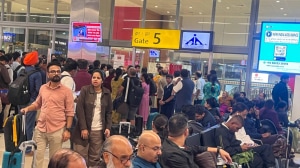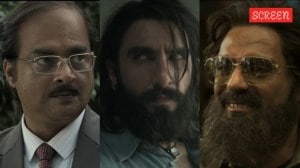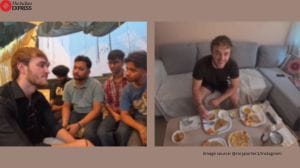Lilting MELODY
Singer Rakesh Pandit and his brother,composer-violinist Deepak Pandit,get candid in an informal chat with Screen about their rich musical lineage,their work in films and outside and other matters musical.
Singer Rakesh Pandit and his brother,composer-violinist Deepak Pandit,get candid in an informal chat with Screen about their rich musical lineage,their work in films and outside and other matters musical.
We meet up in a coffee shop in the suburbs. The ethnically-atiired Rakesh Pandit is shy to the point of being reserved,and his younger brother Deepak speaks often on his behalf as well. Sons of the renowned classical artiste Shambhu Pandit and nephews of Shankar Pandit,who together formed the super-successful qawwali duo Shankar-Shambhu,they form two of five brothers,all of whom are into music in various ways.
The lineage
My uncle Shankarji and father Shambhuji were trained musicians and gawaiyye (singers who could sing across every genre), smiles Rakesh. My father liked spiritual music and his style tended to be spiritually-oriented. I started training in music under him at the age of three,and over the years,I learnt all genres of music from classical and folk to bhajan,ghazal,qawwali and Sufiana songs. At 13,I did my Visharad (graduation in music) from the Prayag Sangeet Samiti and began singing at functions and in front of guests.
Chips in Deepak Pandit,My uncle Shankarji had a dream,that his children and the five of us form a band of sorts,where we would be a complete music group. He thus wanted all of us to master at least one instrument each. But he died in 1983 and my father was so affected that he too stopped singing. In 1990,my father also passed away.
Deepak recalls how in their joint home that is still there in a distant Mumbai suburb,it was a norm to have musical titans stay for months with the Pandits. Ustad Bade Ghulam Ali Khansaab and Ustad Amir Khansaab were among the all-time greats who were like family members, he says.
The exit of their father and uncle slowed down the pace of their own professional progress. If you see the track-record of second-generation musicians,it is far easier to get a platform to show your talent when the parents are alive and active, declares Deepak. That was our loss. But the benefits balanced things out. It was after our work and talent were recognised that the industry became aware that we were the sons of Shambhu Pandit.
Rakesh fills in about their other brothers. Hira is a popular tabla player,Pradeep is also a musician,while Raja is a guitarist,arranger and composer. Raja,along with Shail Hada,arranged and shaped the complete music of Guzaarish among other things. I have also sung in the film.
The different voice
Rakesh was first noticed by the industry in 1994 when he rendered the high-pitched alaaps and the sargam for Viju Shahs chartbuster Tu cheez badi hai mast mast from Mohra. Maine Viju ke liye doosre filmon mein bhi gaaya, smiles the singer. There was the popular Rama o Rama (Tere Mere Sapne),the multi-singer title-song of Bade Miyan Chhote Miyan,Dono taraf aag hai lagi from Pyaar Ishq Aur Mohabbat and songs in Bulandi and Shikhar. But technically,my first song was the qawwali filmed on Kader Khan,Milte hain dil se dil in Mera Dil Tere Liye in 1991. The music was by Babul Bose and it was a 11-minute song. However,the film went unnoticed.
Rakesh has over a 100 songs to his credit,but since he only did the special flourishes in a lot of them,like alaaps and other needs specific to the song,his name was billed less frequently. Uttam Singhs Hum judaa ho gaye from Gadar – Ek Prem Katha,Ismail Darbars Chilman uthegi nahin from Kisna and Vishal Bhardwajs Jhin min jhini and Rubaru from Maqbool and Bhool na jayenge from Ramji Londonwaley are songs he comes up with after reflection.
But Rakesh was recognised in the real sense only after Namak ishq ka (Omkara under Vishal Bhardwaj) and his solo song Dil tod ke na jaa (Pyaar Ke Side/Effects with Pritam). Among his more recent songs are Yoon shabnami in which Rakesh comes in with the section Dekho chand aaya from Saawariya and what is generally considered the best song in Guzaarish – Tera zikr hai with Shail Hada. Another popular song was Maange ki ghodi from Do Dooni Chaar.
Why is Rakesh not as busy as he could have been? Is it because he has been branded as a classical vocalist?
Says Rakesh,I have sung for almost all composers – Anu Malik,Nadeem-Shravan,Jatin-Lalit,Himesh Reshammiya,Shankar-Ehsaan-Loy,Vishal Shekhar and others. But Deepak is more vociferous and takes up for his brother. The industry is known for its bhed-chaal. Alaaps,sargam,taans and backing vocals are something that very few singers can outgrow and turn into full-fledged playback singers – though they are exceptions like Kunal Ganjawala. My brother has even recently sung backing vocals in two major hits – Tum jo aaye zindagi mein and Pee loon in Once Upon A Time In Mumbaai.
Strings attached
Deepak,on his part,has been equally low-profile. I have been often asked to rectify botched-up musical arrangements and background scores without getting credit, he shrugs. But my official work is good enough for me not to bother about those aspects. The musician has arranged 200-plus albums,most of which have been with heavyweights like Jagjit Singh and Anup Jalota besides albums or songs for Roopkumar Rathod,Pankaj Udhas,Bhupinder-Mitali and others. I am now doing a special symphonic concert with Jagjitji wherein I will arrange his repertoire of evergreen songs on stage in a concert. A prestige assignment is Matters Of The Heart,a project produced by Sandeep Chowta with 45 artistes from around the world,each distinguished in some way,like Frank Gambale,the worlds fatest guitarist and Virgil Donati. I am one of the three Indian artistes on it. The album will be out on Sony Music in June.
Deepak has independently scored music for a few films too,like the recent Yeh Faasley,U Bomsi & Me and Sanjay Guptas The Great Indian Butterfly. …Butterfly had an interesting score – there was a gospel song,two songs in English and a thumri. I have also composed a very unusual score for I Am Kalam,the Nila Madhab Panda film that has already won multiple national and international laurels.
But Deepak is doubly upset with Saregama for the cavalier way in which they have treated two of his albums – the soundtrack of the film Yeh Faasley and a project with Rakesh that the music label has been sitting on for nine long years! Yeh Faasleys music rights have been given to them but they have not released the music,which is very melodious. As for the album,you can imagine what happens in nine yearsan artistes peak can be over! he says with helpless indignation. Did you know that Jagjitji,who I consider a total musician who sings,composes,arranges and can design sound himself,has anchored our album? And it is on the immortal poetry of Hazrat Amir Khusrau!
This time,it is Rakesh who takes up for his brother. My brother is so talented that he presented his first solo violin concert at the age of 11! He is a B.A. in music. He has also learnt Western notations from Pt. Ramprasad Sharma,composer Pyarebhais father.
A musical view
The brothers feel that in many ways the music scene is better than it was about a decade or more ago. But they are aware of the deficiences too. As Deepak says,A major difference is that today there is little importance given to the quality of verse,which to me is extremely vital. All that they want is a catchphrase. There is less emphasis on melody and much more on Sound Design,whereas there should be a balance. I have also observed a lot of music directors taking up work as a contract,and they or the lyricist are even be missing from the recordings! Agrees Rakesh,Short-cuts are the norm. Earlier it was about the exact requirements of raag,dhun,the words,rehearsals and a constant ambition to excel.
Lessons from dad
What are the most valuable lessons they imbibed from or were taught by their father? Says Deepak,The most important lesson he gave us was to stick to ethics and principles in life and to be honest,especially in music. Today,thanks to him and my training – he ensured that I learnt the A to Z of music,Poora grammar bataake gaye,so that I could choose what I needed each time – I know the range of every instrument and their strengths and limitations even as a group,like brass,strings and so on. I know the raags. But I still do not take things for granted. I do my riyaaz every day even now.
Rakesh recalls how the brothers were trained individually and in groups. Gaayaki was something on which our father led great stress. He told me that I should be able to sing every kind of song. Hamare gale ki taiyyari honi chahiye,aur hamare mein ek sampoornata (completeness) hona zaroori hai. And yet,he also told us that no artiste can be perfect,so one should never degrade anyone. And he taught us how to respect our elders,even if some may be weaker as artistes.
- 01
- 02
- 03
- 04
- 05































